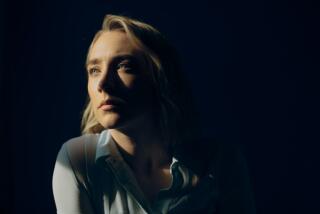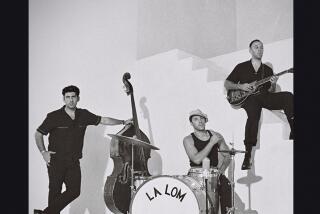‘Run Lola’ Keeps Playful Tale Moving
“Run Lola Run” is the message, but flame-haired Lola hardly needs the encouragement. Tireless, unstoppable, fueled by the energy of desperation, Lola flies through the streets of Berlin, dodging cars, parting columns of nuns, always moving, moving, moving.
Not only does Lola run, she takes this hyperkinetic pop culture firecracker of a film with her. Writer-director Tom Tykwer’s restless, inventive work, the most energetic from Germany in recent years, is about the playful inventiveness inherent in the medium itself. Cinema is a contest without rules, a place where anything can happen, and if you don’t believe it, just keep watching.
Tykwer not only wrote and directed, he also (with Johnny Klimek and Reinhold Heil) did the hypnotic, insistent techno-pop music that drives everything before it. As essential in its own way as Anton Karas’ celebrated zither work was to “The Third Man,” “Lola’s” music is perfectly suited to the film’s aims and just about addictive in its throbbing, insinuating rhythms.
Before all that running begins, Tykwer provides a brief prologue and a statement of cinematic philosophy couched in a homily about soccer: “The ball is round, the game lasts 90 minutes, all the rest is pure theory.” Someone shouts, “Here we go,” the ball is kicked, and everything begins.
It starts with a phone call, from desperate small-time operator Manni (Moritz Bleibtreu) to his girlfriend Lola (Franka Potente). “Help me, Lola,” he screams from a public phone booth. “I don’t know what to do.”
Usually Lola picks Manni up after his quasi-legal transactions, but unavoidable circumstances made her late this time. Manni panicked, took the subway and ended up leaving a plastic bag filled with 100,000 marks on the train where an addled homeless man soon walked off with it.
In 20 minutes, Manni’s unforgiving boss Ronnie, who has abbreviated lives for less, will show up and have to be told that the money is gone. So unless Lola can show up in 20 with the cash, Manni will be history. “Love can do anything,” Lola determinedly proclaims, and sets out on a dead run across the city to round up the money and save her hysterical beau.
Lola’s first thought is to reach her banker father, but this is always a movie where the journey is more important than the destination. Dressed for speed in pale green pants and a light blue top, Lola has a confident, all-out stride (actress Potente, surprisingly, is said not to be a runner off-screen) and it is exhilarating to watch her on the move.
Lola’s journey puts her in contact with physical obstacles like cars and people whose path she happens to cross. And just because it’s a jazzy thing to do, whenever Lola runs into anyone, filmmaker Tykwer edits in a quick and amusing flash-forward to that person’s future life, added at no extra charge.
While “Run Lola Run” is in part a “High Noon” with a raffish punk attitude, given that Lola’s 20-minute journey is shot in real time, it’s to be expected that when that timeis up this film still has any number of surprises to reveal.
Among the games that “Lola” plays is a kind of reshuffling of the deck of chance, showing how even the slightest change in small things can have a broad impact on what really matters. If that sounds murky, the film itself couldn’t be clearer in its effects.
Fortunately for a picture that lives entirely on the surface, filmmaker Tykwer proves to be as tireless in terms of invention as his heroine is pounding the streets of Berlin. Working with cinematographer Frank Griebe and editor Mathilde Bonnefoy, he mixes up angles and cuts with aplomb, even turning Lola into an animated character when it suitshim.
Lola and Manni can finally be understood as no more than pieces in a game. So it’s impressive how great an air of urgency and involvement this film creates around them, and how thoroughly entertaining it is into the bargain.
Cleverness is “Run Lola Run’s” greatest asset and extends even to the film’s closing credits, which crawl onto the screen from the bottom to the top. While that’s happening, the huge word “ENDE” edges slowly on the screen and off. Like the rest of this always lively film, we hate to see it go.
* MPAA rating: R, for some violence and language. Times guidelines: Some gunplay and adult hostility along with bad language.
‘Run Lola Run’
Franka Potente: Lola
Moritz Bleibtreu: Manni
Herbert Knaup: Lola’s father
Armin Rhode: Mr. Schuster
Joachim Krol: Norbert von Au (tramp)
Nina Petri: Mrs. Hanson
An X-Filme Creative Pool presentation of a Bavaria Film International production, released by Sony Pictures Classics. Director Tom Tykwer. Producer Stefan Arndt. Screenplay by Tom Tykwer. Cinematographer Frank Griebe. Editor Mathilde Bonnefoy. Costumes Monika Jacobs. Music Tom Tykwer, Johnny Klimek, Reinhold Heil. Set design Alexander Manasse. Running time:1 hour, 21 minutes.
Exclusively at the Nuart, 11272 Santa Monica Blvd., West Los Angeles, (310) 478-6379.
More to Read
Only good movies
Get the Indie Focus newsletter, Mark Olsen's weekly guide to the world of cinema.
You may occasionally receive promotional content from the Los Angeles Times.











